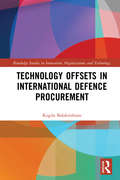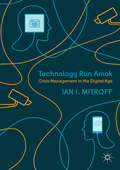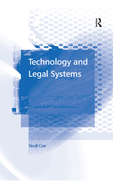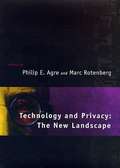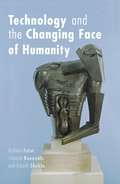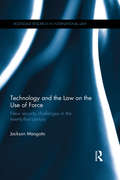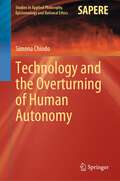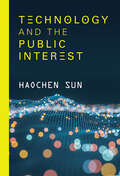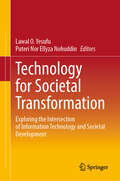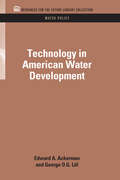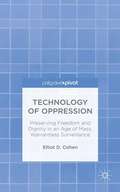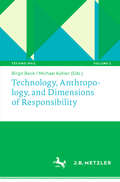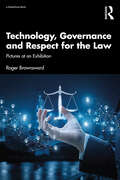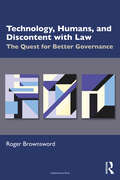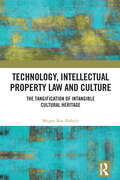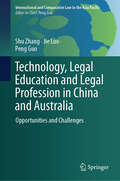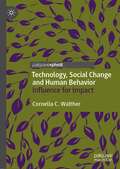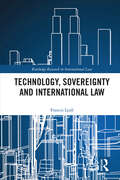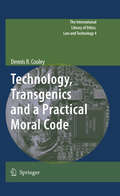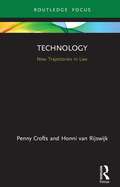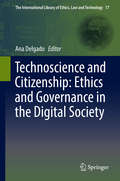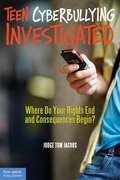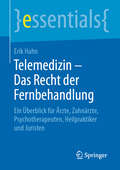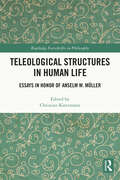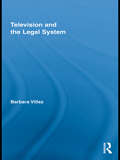- Table View
- List View
Technology Offsets in International Defence Procurement (Routledge Studies in Innovation, Organizations and Technology)
by Kogila BalakrishnanTechnology offsets, a nonconventional international trade-financing tool, is used by governments (buyers) to obtain industrial and technological benefits from companies (sellers) as part of international procurement. Offsets deals involve billions of dollars and this practice exists in around 80 countries around the world. Though offsets is a popular practice in defence, it is increasingly gaining popularity in civil sectors. Offsets is often tainted by controversy and receives bad press. What then makes offsets popular? Governments claim that offsets delivers technology and knowledge transfer, skills in high technology sectors and employment, and offsets expands export opportunities through participation in OEM supply chains. For companies, offsets is mainly employed as a tool to obtain a competitive edge and win sales in international business. In the past, there have been mixed results of case studies on the impact of offsets successes and failures. Considering the mismanagement of globalisation, unfair trade agreements and current political and economic discontent, there is a stronger need for governments and companies to use vehicles such as offsets to create a relationship of trust and commitment for sustainable development. This book fills the gap in offsets and focuses on how to manage offsets more effectively by addressing issues of strategy, policy and implementation, technology management, governance and risk. Technology Offsets in International Defence Procurement is designed for those studying international procurement, international trade, international business, technology management, defence policy and industrial policy. This book will also be of interest to practitioners and policy makers in both government and industry.
Technology Run Amok: Crisis Management In The Digital Age
by Ian I. MitroffThe recent data controversy with Facebook highlights that the tech industry as a whole was utterly unprepared for the backlash it faced as a result of its business model of selling user data to third parties. Despite the predominant role that technology plays in all of our lives, the controversy also revealed that many tech companies are reactive, rather than proactive, in addressing crises. This book examines society's failure to manage technology and its resulting negative consequences. Mitroff argues that the "technological mindset" is responsible for society's unbridled obsession with technology and unless confronted, will cause one tech crisis after another. This trans-disciplinary text, edgy in its approach, will appeal to academics, students, and practitioners through its discussion of the modern technological crisis.
Technology and Legal Systems
by Noel CoxThe advent of the knowledge economy and society has made it increasingly necessary for law reformers and policy makers to take account of the effects of technology upon the law and upon legal and political processes. This book explores aspects of technology's relationship with law and government, and in particular the effects changing technology has had on constitutional structures and upon business. Part I examines the legal normative influence of constitutional structures and political theories. It focuses on the interrelationship between laws and legal procedure with technology and the effect technology can have on the legal environment. Part II discusses the relationship between government and technology both at the national and international level. The author argues that technology must be contextualized within a constitution and draws on historical and contemporary examples to illustrate how technology has both shaped civilizations and been the product of its political and constitutional environment.
Technology and Privacy: The New Landscape
by Philip E. Agre Marc RotenbergPrivacy is the capacity to negotiate social relationships by controlling access to personal information. As laws, policies, and technological design increasingly structure people's relationships with social institutions, individual privacy faces new threats and new opportunities. Over the last several years, the realm of technology and privacy has been transformed, creating a landscape that is both dangerous and encouraging. Significant changes include large increases in communications bandwidths; the widespread adoption of computer networking and public-key cryptography; mathematical innovations that promise a vast family of protocols for protecting identity in complex transactions; new digital media that support a wide range of social relationships; a new generation of technologically sophisticated privacy activists; a massive body of practical experience in the development and application of data-protection laws; and the rapid globalization of manufacturing, culture, and policy making. The essays in this book provide a new conceptual framework for the analysis and debate of privacy policy and for the design and development of information systems. The authors are international experts in the technical, economic, and political aspects of privacy; the book's strength is its synthesis of the three. The book provides equally strong analyses of privacy issues in the United States, Canada, and Europe. Contributors: Philip E. Agre, Victoria Bellotti, Colin J. Bennett, Herbert Burkert, Simon G. Davies, David H. Flaherty, Robert Gellman, Viktor Mayer-Schouml;nberger, David J. Phillips, Rohan Samarajiva.
Technology and the Changing Face of Humanity (Philosophica)
by Feist, Richard; Beauvais, Chantal; Shukla, RajeshA philosophical examination of technology’s growing influence. This pioneering collection explores the relationship between technology and free will. Rejecting the notion of technology as a neutral addition to our lives, the contributors examine the type and degree of our society’s technological dependence. Technology is revealed as something from which we have, and will continue to have, difficulty separating ourselves, both as individuals and as a society. Without articulating a purely deterministic perspective, this collection illuminates the powerful influence technology has on our world and our perception of it.
Technology and the Law on the Use of Force: New Security Challenges in the Twenty-First Century (Routledge Research in International Law)
by Jackson MaogotoAs governmental and non-governmental operations become progressively supported by vast automated systems and electronic data flows, attacks of government information infrastructure, operations and processes pose a serious threat to economic and military interests. In 2007 Estonia suffered a month long cyber assault to its digital infrastructure, described in cyberspace as ‘Web War I’. In 2010, a worm—Stuxnet—was identified as supervisory control and data acquisition systems at Iran’s uranium enrichment plant, presumably in an attempt to set back Iran’s nuclear programme. The dependence upon telecommunications and information infrastructures puts at risk Critical National Infrastructure, and is now at the core of national security interests. This book takes a detailed look at these new theatres of war and considers their relation to international law on the use of force. Except in cases of self-defence or with the authorisation of a Security Council Resolution, the use of force is prohibited under the UN charter and customary international law. However, the law of jus ad bellum was developed in a pre-digital era where current technological capabilities could not be conceived. Jackson Maogoto asks whether the law on the use of force is able to deal with legal disputes likely to arise from modern warfare. Key queries include how one defines an armed attack in an age of anti-satellite weaponry, whether the destruction of a State’s vital digital eco-system or the "blinding" of military communication satellites constitutes a threat, and how one delimits the threshold that would enliven the right of self-defence or retaliatory action. The book argues that while technology has leapt ahead, the legal framework has failed to adapt, rendering States unable to legally defend themselves effectively. The book will be of great interest and use to researchers and students of international law, the law of armed conflict, Information Technology and the law, and counter-terrorism.
Technology and the Overturning of Human Autonomy (Studies in Applied Philosophy, Epistemology and Rational Ethics #66)
by Simona ChiodoThis book offers an extensive historical, philosophical and ethical discussion on the role of autonomous technologies, and their influence on human identity. By connecting those different perspectives, and analysing some practical case studies, it guides readers to dissect the relationship between machine and human autonomy, and machine and human identity. It analyses how the relationship between human and technology has been evolving in the last few centuries. Last, it aims at proposing an explanation on the reason/s why humans have been keen on developing their own autonomy’s perfect avatar.
Technology and the Public Interest
by Haochen SunIn this groundbreaking work, Haochen Sun analyzes the ethical crisis unfolding at the intersection of technology and the public interest. He examines technology companies' growing power and their increasing disregard for the public good. To tackle this asymmetry of power and responsibility, he argues that we must reexamine the nature and scope of the right to technology and dynamically protect it as a human right under international law, a collective right under domestic civil rights law, and potentially a fundamental right under domestic constitutional law. He also develops the concept of fundamental corporate responsibility requiring technology companies to compensate users for their contributions, assume an active role responsibility in upholding the public interest, and counter injustices caused by technological developments.
Technology for Societal Transformation: Exploring the Intersection of Information Technology and Societal Development
by Lawal O. Yesufu Puteri Nor Ellyza NohuddinThis book extensively investigates the dynamic relationship between information technology and societal transformation. The book explores a range of applied IT uses, ranging from educational technology to the complex applications of cybersecurity, the promise of blockchain technologies, e-commerce and rural development, and social media and its applications in political activism. Investigating key topics in social development and the role information technology plays in elevating our lives, the book navigates this ever-changing landscape of technological innovation to determine how it can be a source for good and improve our lives by driving positive social change. While focusing on the practical application of technology to real-world situations, examples, and cases, the book primarily focuses on educational development, entrepreneurship, sociopolitical transformation, and the security and defence of society. Collectively, these explorations serve to better highlight how technology can be harnessed in the creation of a more inclusive and equitable society. Hence, the book will be a useful read for students, academics, policymakers, business and social investors.
Technology in American Water Development (RFF Water Policy Set)
by Edward A. Ackerman George O.G. LoffFirst Published in 2011. Routledge is an imprint of Taylor & Francis, an informa company.
Technology of Oppression: Preserving Freedom and Dignity in an Age of Mass, Warrantless Surveillance
by Elliot D. CohenIn the wake of the National Security Agency expose of 2013, scholars and citizens alike have been turning a critical eye toward United States surveillance policies. Technology of Oppression contributes to this ongoing discussion with a systematic analysis of mass surveillance in America and allied countries, detailing how lax intelligence laws have allowed these technologies to undermine common civil liberties. Toward the practical end of reigning in existing surveillance technologies, Cohen offers a concise proposal listing the policy changes and software developments necessary to establish an internet-based, global forum for transparently affecting legal and technological change. "
Technology, Anthropology, and Dimensions of Responsibility (Techno:Phil – Aktuelle Herausforderungen der Technikphilosophie #1)
by Michael Kühler Birgit Beck“With great power comes great responsibility.” In today’s world, with our growing technological power and the knowledge about its impact, we are considered to be responsible for many instances that not long ago would have been deemed a matter of fate. At the same time, the looming options of, e.g., genome editing or neuroprosthetics, threaten traditional notions of responsibility if no longer the person but the technology involved is deemed to be responsible for a specific behaviour. The growing ethical debate on the expansion of human responsibility, e.g. when it comes to human-machine-interaction, ambient intelligence, or reproductive technologies, thus intertwines with the challenge to formulate an appropriate understanding of the concept of personal responsibility and our respective anthropological self-understanding in today’s technological world. The volume brings together both perspectives and aims at illuminating crucial dimensions of responsibility in light of technological innovation and our self-understanding as responsible beings.
Technology, Governance and Respect for the Law: Pictures at an Exhibition
by Roger BrownswordIn the context of the technological disruption of law and, in particular, the prospect of governance by machines, this book reconsiders the demand that we should respect the law, simply because it is the law. What does ‘the law’ need to look like to justify our respect? Responding to this question, the book takes the form of a dialectic between, on the one side, the promise of the prospectus for law and, on the other, the discontent provoked by the performance of law in practice; this is followed by a synthesis. Four pictures of law are considered: two are traditional pictures – law as order and law as just order; and two are prompted by the technological disruption of law – law as governance by machines and law as self-governance by humans. These pictures are tested in five performance areas: contract law, criminal law, biolaw, information law, and constitutional law. The synthesis, revealing the complexity of the demand for respect, highlights three particular points. First, the only prospectus for law that clearly commands respect is one that is committed to protecting the global commons (the preconditions for humans to form their own communities with their own forms of governance); second, any form of governance by humans will invite reservations and push-back against the demand for respect; and, third, governance by machines is not so much a superior form of governance as a radically different form in which questions about respect are redundant. This book will appeal to scholars and students with interests in the broad and burgeoning field of law, regulation and technology, as well as to legal theorists, practitioners, and others interested in the impact of new technology on law.
Technology, Humans, and Discontent with Law: The Quest for Better Governance
by Roger BrownswordThis book analyses discontent with law and assesses the prospect of better governance by technology. In the first part of the book, where the context is ‘low tech’, the range of discontent with law is examined; the underlying reasons for such discontent are identified (namely, the human nature of the legal enterprise, its reliance on rules, and the pluralistic nature of human communities); and the reasonableness of such discontent is assessed. In the second part of the book, where the context is ‘high-tech’ (with new tools becoming available to undertake governance functions), the question is whether discontent with law is further provoked or, to the contrary, is eased. While new technologies provoke further discontent with law’s claimed authority, its ineffectiveness, and its principles, positions, and policies, they also promise more effective and efficient ways of achieving order. The book closes with some reflections on the ambivalence that humans might experience when faced with the choice between law’s governance and apparently better performing governance by technology. That law’s governance is imperfect is undeniable; that humans should quest after better governance is right; but, the shape of our technological futures is unclear. This accessibly written book will appeal to scholars and students who are working in the broad and burgeoning field of law, regulation, and technology, as well as to legal theorists, political scientists, and sociologists with interests in the impact of new technology.
Technology, Intellectual Property Law and Culture: The Tangification of Intangible Cultural Heritage
by Megan Rae BlakelyFocusing on cultural expressions that are most likely to intermingle with copyright law, trademark and IP-adjacent regulations, this book examines contemporary issues in technology, intellectual property law, and culture.Intangible Cultural Heritage can consist of traditional knowledge, songs, craftsmanship, dance, and other practices, as well as the associated cultural artefacts and spaces; a widely varied global living heritage, transmitted generationally, must be allowed to organically evolve, often defying the process of identification so desirable in the realm of legal protections. This nebulous essence is particularly ill-suited to modern legal frameworks that can conflate the creative outputs that copyright is meant to protect with shared cultural practices. Combining a legal perspective with historical tact, the book develops a theoretical model to track the interaction amongst these issues as well as to make policy recommendations based on the existing and projected possible future outcomes. Several chapters of the book will be dedicated to contemporary issues where this framework and interaction are currently developing, focussing on law and technology issues with archiving and museums, online platforms and copyright infringement, and communities and creative production in virtual worlds.The book will be of interest to students and scholars in the field of copyright law and intellectual property law.
Technology, Legal Education and Legal Profession in China and Australia: Opportunities and Challenges (International and Comparative Law in the Asia Pacific)
by Peng Guo Shu Zhang Jie LuoThis book adopts a comparative and empirical approach to the discussion relating to the subject matter. The book compares various selected topics in both China and Australia, drawing attention to historical, contemporary, and international characteristics. Also, in discussing the topics, the authors will conduct surveys and interviews to get first-hand materials and describe the real situations in both countries. To the best knowledge of the authors, this is the first time that this approach has been adopted to compare legal education and the legal profession focusing on China and Australia. This book introduces legal education and the legal profession in China and Australia to lay a foundation based on which it further compares them. More importantly, this book discusses some selected topics relating to legal education and the legal profession in the context of globalization, the digital age, and COVID-19. The intended readership is an international audience including students at both undergraduate and graduate levels, legal scholars, and legal practitioners in general, and those in China and Australia in particular. This book intends to analyse the discourse of legal education and identify and create innovative ways of teaching and learning the law in China and Australia. It focuses on research, theory, and practice within legal education and the legal profession based on imaginative and sophisticated educational thinking from an empirical and comparative perspective. It also takes a broad view of theory and practice relating to legal education and the legal profession. It is sensitive to the diversity of contexts in which law is taught, learned, and practised.
Technology, Social Change and Human Behavior: Influence for Impact
by Cornelia C. WaltherThis book looks at the changing continuum that links individuals, communities and society. An outline of Aspirational Algorithms (AA) and Valuable Wearables is presented as tools to shift from an AI culture to the cultivation of Augmented Humanity (AH). The human mindset that is behind the design and use of technology determines the outcomes of technology. If the intended outcome is the common good, then the preceding human aspiration must be geared toward that goal. Only technology that is conceived with the aspiration of a society that lifts individuals to fulfill their potential can be a game-changer for good. Seeing the constant interplay between the four levels of human existence – soul, heart, mind, body, expressed as aspirations, emotions, thoughts and sensations, how technology may serve to systematically sway individuals from inspiration to desire, from informing to the ignition of tangible transformation. This transition is explained in the book along the scale of influence. Two convergent and mutually influencing dynamics are analyzed: first, the influence of values and aspirations on the impact of technology, and second, the influence of technology on the attitude and action of users. Both assess how hardware and software can serve a maximum of people to live a meaningful happy life.
Technology, Sovereignty and International Law (Routledge Research in International Law)
by Francis LyallThe dogma of the sovereignty of the state, deriving from the Peace of Westphalia, underpins much of the modern-day international system. However, developments in recent technology have led this ideology to depart from reality. Viewing state sovereignty through the prism of public international law, the book will begin with an overview of the settlement of Westphalia, how it has influenced international documents ever since, and how the advantages of centralised decisions came to be perceived. By surveying the Law of the Sea, Maritime Law, Air and Aviation, Telecommunications, Postal Services, Space Law and Mensuration, the book demonstrates how, in each, the interplay between state sovereignty and developing technologies have caused significant legal change. Some changes, Lyall argues, such as international measures of time and geography, have been born out of convenience, facilitated by technology developed for the purpose. Other areas of change developed out of a desire to reconcile conflicts or harmonise necessary state regulation. The book analyses the reasons behind these changes, and discusses the ongoing attempts to balance state equality, measures adopted by new institutions to secure comprehensive representation, and ends by looking to the future of state sovereignty in an increasingly globalised world. The book is of use to any student or scholar interested in policy making, international law and international affairs, both legal and scientific, as well as those looking at legal administrative issues and government officiation.
Technology, Transgenics and a Practical Moral Code
by Dennis R. CooleyEthical debate often lags far behind the development of new technology. This book sets out a practical moral code with wide-ranging applicability, designed to include moral principles and a hierarchical value theory based partly on the work of Kant and Mill.
Technology: New Trajectories in Law (New Trajectories in Law)
by Penny Crofts Honni van RijswijkPlacing contemporary technological developments in their historical context, this book argues for the importance of law in their regulation. Technological developments are focused upon overcoming physical and human constraints. There are no normative constraints inherent in the quest for ongoing and future technological development. In contrast, law proffers an essential normative constraint. Just because we can do something, does not mean that we should. Through the application of critical legal theory and jurisprudence to pro-actively engage with technology, this book demonstrates why legal thinking should be prioritised in emerging technological futures. This book articulates classic skills and values such as ethics and justice to ensure that future and ongoing legal engagements with socio-technological developments are tempered by legal normative constraints. Encouraging them to foreground questions of justice and critique when thinking about law and technology, the book addresses law students and teachers, lawyers and critical thinkers concerned with the proliferation of technology in our lives.
Technoscience and Citizenship: Ethics and Governance in the Digital Society
by Ana DelgadoThis book provides insights on how emerging technosciences come together with new forms of governance and ethical questioning. Combining science and technologies and ethics approaches, it looks at the emergence of three key technoscientific domains - body enhancement technologies, biometrics and technologies for the production of space -exploring how human bodies and minds, the movement of citizens and space become matters of technoscientific governance. The emergence of new and digital technologies pose new challenges for representative democracy and existing forms of citizenship. As citizens encounter and have to adapt to technological change in their everyday life, new forms of conviviality and contestation emerge. This book is a key reference for scholars interested in the governance of emerging technosciences in the fields of science and technology studies and ethics.
Teen Cyberbullying Investigated: Where Do Your Rights End and Consequences Begin?
by Thomas A. JacobsHow do teens know when they might be one click away from the clink? In Teen Cyberbullying Investigated, Judge Tom Jacobs presents a powerful collection of landmark court cases involving teens and charges of cyberbullying, which includes: sending insulting or threatening emails, text, or instant messages directly to someone; spreading hateful comments about someone through emails, blogs, or chat rooms; stealing passwords and sending out threatening messages using a false identity; and building a Web site to target specific people. Each chapter features the seminal case and resulting decision, asks readers whether they agree with the decision, and urges them to think about how the decision affects their lives. Chapters also include related cases, important facts and statistics, and suggestions for further reading. With an ever-increasing number of serious cases of cyberbullying and school violence, this book is needed more urgently than ever.
Telemedizin – Das Recht der Fernbehandlung: Ein Überblick für Ärzte, Zahnärzte, Psychotherapeuten, Heilpraktiker und Juristen (essentials)
by Erik HahnDieses essential zeigt praxisnah die rechtlichen Anforderungen an eine (ausschließliche) Fernbehandlung aus deutscher Perspektive. Die berufs-, vertrags-, vergütungs-, werbe- und arzneimittelrechtlichen Grundlagen sowie die jeweiligen Besonderheiten für Ärzte, Zahnärzte, Psychotherapeuten und Heilpraktiker werden umfassend erläutert. Es bietet zudem einen Überblick über die europarechtlichen Vorgaben und deren Umsetzung im nationalen Recht. Außerdem wird das unterschiedlich ausgestaltete Fernbehandlungsrecht der einzelnen Heilberufskammern dargestellt.
Teleological Structures in Human Life: Essays for Anselm W. Müller (Routledge Festschrifts in Philosophy)
by Christian KietzmannThis is the first collection of essays devoted to the thought of Anselm W. Müller. It brings to the attention of the English-speaking world an influential and highly regarded philosopher who has made important contributions to a wide range of philosophical debates. The volume begins with a biographical sketch of Müller. Arguably, Müller’s most important contributions are to the philosophy of action and virtue ethics. The contributors, which include friends, colleagues, and former students, engage with different aspects of Müller’s thought in these areas. Subjects include his interpretation of Aristotle and Wittgenstein, the teleology of thought and action, the Aristotelian distinction between poiesis and praxis and its application to ethical upbringing, and the possibility of practical knowledge and practical truth. Teleological Structures in Human Life will be of interest to researches and advanced students working on virtue ethics, philosophy of action, and practical reasoning.
Television and the Legal System (Routledge Studies in Law, Society and Popular Culture)
by Barbara VillezThis book examines the American television legal series from its development as a genre in the 1940s to the present day. Villez demonstrates how the genre has been a rich source of legal information and understanding for Americans. These series have both informed and put myths in place about the legal system in the US. Villez also contrasts the US to France, which has seen a similar interest in legal series during this period. However, French television representations of justice are strikingly different, as is the role of fiction in offering viewers the possibility of acquiring significant understandings of their legal system. The book will be an important addition to the study of popular culture and law and will interest legal scholars, sociologists, and media scholars.
